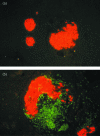Parasitic worms and inflammatory diseases
- PMID: 16965287
- PMCID: PMC1618732
- DOI: 10.1111/j.1365-3024.2006.00879.x
Parasitic worms and inflammatory diseases
Abstract
The debate on whether infection precipitates or prevents autoimmunity remains a contentious one. Recently the suggestion that some unknown microbe can be at the origin of some chronic inflammatory diseases has been countered by accumulating evidence that decreasing infection rates might have an important role to play in the rising prevalence of autoimmune disorders. The 'Hygiene Hypothesis' was initially postulated to explain the inverse correlation between the incidence of infections and the rise of allergic diseases, particularly in the developed world. Latterly, the Hygiene Hypothesis has been extended to also incorporate autoimmune diseases in general. Amongst the various infectious agents, a particular emphasis has been put on the interaction between parasitic worms and humans. Worm parasites have co-evolved with the mammalian immune system for many millions of years and during this time, they have developed extremely effective strategies to modulate and evade host defences and so maintain their evolutionary fitness. It is therefore reasonable to conclude that the human immune system has been shaped by its relationship with parasitic worms and this may be a necessary requirement for maintaining our immunological health. Fully understanding this relationship may lead to novel and effective treatments for a host of deleterious inflammatory reactions.
Figures



Similar articles
-
Regulation of allergy and autoimmunity in helminth infection.Clin Rev Allergy Immunol. 2004 Feb;26(1):35-50. doi: 10.1385/CRIAI:26:1:35. Clin Rev Allergy Immunol. 2004. PMID: 14755074 Review.
-
Helminths in the hygiene hypothesis: sooner or later?Clin Exp Immunol. 2014 Jul;177(1):38-46. doi: 10.1111/cei.12353. Clin Exp Immunol. 2014. PMID: 24749722 Free PMC article. Review.
-
Gross ways to live long: Parasitic worms as an anti-inflammaging therapy?Elife. 2021 Feb 2;10:e65180. doi: 10.7554/eLife.65180. Elife. 2021. PMID: 33526169 Free PMC article. Review.
-
Host-Parasite Interactions Promote Disease Tolerance to Intestinal Helminth Infection.Front Immunol. 2018 Sep 20;9:2128. doi: 10.3389/fimmu.2018.02128. eCollection 2018. Front Immunol. 2018. PMID: 30298071 Free PMC article. Review.
-
Exosome-transported microRNAs of helminth origin: new tools for allergic and autoimmune diseases therapy?Parasite Immunol. 2015 Apr;37(4):208-14. doi: 10.1111/pim.12182. Parasite Immunol. 2015. PMID: 25712154 Review.
Cited by
-
The role of T cells in the enhancement of respiratory syncytial virus infection severity during adult reinfection of neonatally sensitized mice.J Virol. 2008 Apr;82(8):4115-24. doi: 10.1128/JVI.02313-07. Epub 2008 Feb 13. J Virol. 2008. PMID: 18272579 Free PMC article.
-
A parasite-derived 68-mer peptide ameliorates autoimmune disease in murine models of Type 1 diabetes and multiple sclerosis.Sci Rep. 2016 Nov 24;6:37789. doi: 10.1038/srep37789. Sci Rep. 2016. PMID: 27883079 Free PMC article.
-
Immunomodulatory role of Trichinella spiralis-derived antigen on imiquimod-induced psoriasis in mice model.Parasitol Res. 2024 Nov 27;123(11):397. doi: 10.1007/s00436-024-08415-7. Parasitol Res. 2024. PMID: 39592463
-
Eosinophils and mast cells in chronic gastritis: possible implications in carcinogenesis.Hum Pathol. 2008 Sep;39(9):1360-9. doi: 10.1016/j.humpath.2008.01.012. Epub 2008 Jul 9. Hum Pathol. 2008. PMID: 18614201 Free PMC article.
-
Membrane stabilization as a mechanism of the anti-inflammatory activity of methanol extract of garden egg (Solanum aethiopicum).Daru. 2012 Nov 14;20(1):76. doi: 10.1186/2008-2231-20-76. Daru. 2012. PMID: 23351977 Free PMC article.
References
-
- Gale EA. The rise of childhood type 1 diabetes in the 20th century. Diabetes. 2002;51:3353–3361. - PubMed
-
- Pugliatti M, Sotgiu S, Rosati G. The worldwide prevalence of multiple sclerosis. Clin Neurol Neurosurg. 2002;104:182–191. - PubMed
-
- Kim MS, Polychronakos C. Immunogenetics of type 1 diabetes. Horm Res. 2005;64:180–188. - PubMed
Publication types
MeSH terms
Grants and funding
LinkOut - more resources
Full Text Sources

